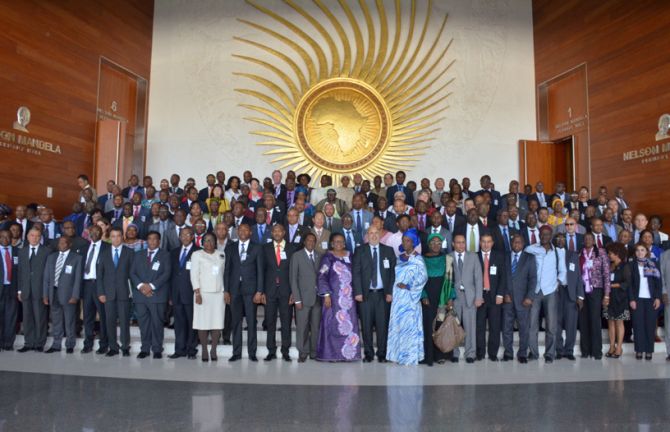

Update
African ministers commit to expanding affordable social protection for all
28 April 2015
28 April 2015 28 April 2015African ministers of social development, labour and employment meeting in Addis Ababa, Ethiopia, have called for expanded social protection for all to ensure inclusive development in Africa. During an event held from 20 to 24 April, and organized by the African Union, ministers agreed that a prosperous Africa can only become a reality if Member States extend comprehensive social protection measures.
Access to affordable and quality education and health services are among the measures that should be expanded to all, in particular vulnerable people. These include people living with and affected by HIV, women, children, people living with disabilities and older people.
The ministers further agreed that social protection policies and programmes in the continent should include social and cash transfers, as well as food and health security.
The 2014 UNAIDS Gap report highlights that cash transfers are a powerful tool for HIV prevention and treatment among young women and people living with HIV. In South Africa, a national study found that a publicly funded cash transfer programme had managed to reduce transactional sex by 53% and age-disparate sex by 71% among adolescent girls in families between 2009 and 2012. This is important in order to reduce their risk of exposure to unsafe sexual behaviour and the low condom use linked to relationships with large age differences.
Quotes
“South Africa was hit hard by HIV, but with high investments from the public and private sectors, including for social protection measures, we’ve been able to drastically reduce the rate of infections. Social protection is an important tool for the AIDS response and inclusive development.”
“We have evidence that social protection is a strategic tool to reduce vulnerabilities and inequalities, eliminate poverty and improve the productivity of the African workforce. Social protection efforts should extend to address gender inequality, HIV and other vulnerabilities in both the formal and informal sectors.”
“We need to ensure a strong social protection agenda that aligns with the African Union Agenda 2063 and is based on human rights. Social protection is important, particularly for women, children, people with disabilities and people from socially excluded groups, to ensure that no one is being left behind.”
Resources
Region/country
- West and Central Africa
- Benin
- Burkina Faso
- Burundi
- Cameroon
- Cape Verde
- Central African Republic
- Chad
- Congo
- Côte d'Ivoire
- Democratic Republic of the Congo
- Equatorial Guinea
- Gabon
- Gambia
- Ghana
- Guinea-Bissau
- Guinea
- Liberia
- Mali
- Mauritania
- Niger
- Nigeria
- Sao Tome and Principe
- Senegal
- Sierra Leone
- Togo
- Eastern and Southern Africa
- Angola
- Botswana
- Comoros
- Eritrea
- Ethiopia
- Kenya
- Lesotho
- Madagascar
- Malawi
- Mauritius
- Mozambique
- Namibia
- Rwanda
- Seychelles
- South Africa
- South Sudan
- Eswatini
- Uganda
- United Republic of Tanzania
- Zambia
- Zimbabwe



